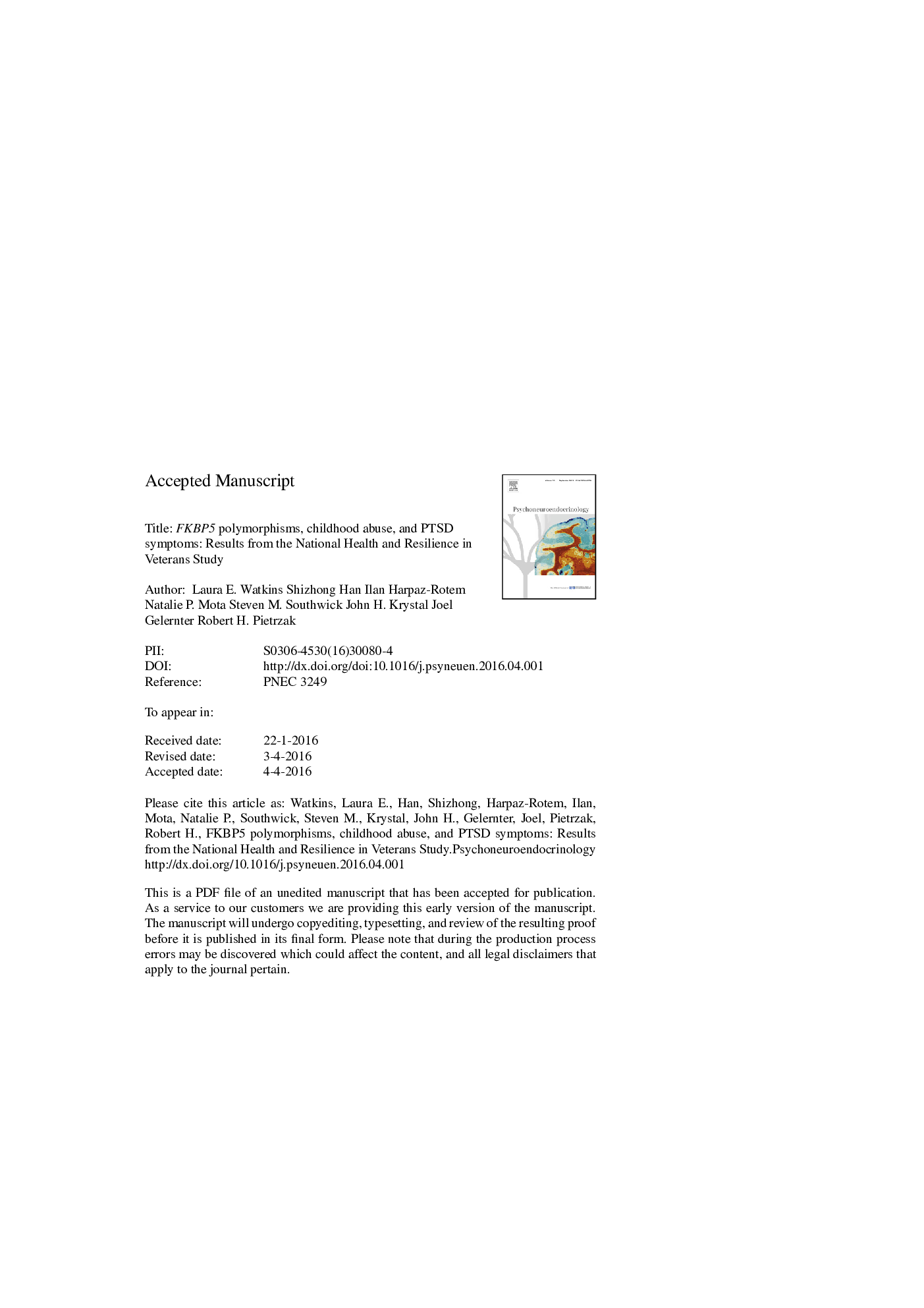| کد مقاله | کد نشریه | سال انتشار | مقاله انگلیسی | نسخه تمام متن |
|---|---|---|---|---|
| 6818059 | 547474 | 2016 | 31 صفحه PDF | دانلود رایگان |
عنوان انگلیسی مقاله ISI
FKBP5 polymorphisms, childhood abuse, and PTSD symptoms: Results from the National Health and Resilience in Veterans Study
دانلود مقاله + سفارش ترجمه
دانلود مقاله ISI انگلیسی
رایگان برای ایرانیان
کلمات کلیدی
موضوعات مرتبط
علوم زیستی و بیوفناوری
بیوشیمی، ژنتیک و زیست شناسی مولکولی
علوم غدد
پیش نمایش صفحه اول مقاله

چکیده انگلیسی
Polymorphisms in the FK506 Binding Protein 5 (FKBP5) gene may interact with childhood abuse to increase risk of developing posttraumatic stress disorder (PTSD) symptoms. The objective of this study was to examine the relationship of four previously identified FKBP5 putative risk SNPs (rs9296158, rs3800373, rs1360780, rs947008), childhood abuse, and lifetime PTSD symptoms, including contemporary phenotypic models of PTSD symptoms, in two nationally representative samples of European-American (EA) U.S. military veterans. The main sample included 1585 EA veterans who participated in the National Health and Resilience in Veterans Study (NHRVS), and the replication sample included 577 EA veterans who participated in a second baseline cohort survey of the NHRVS. Outcome variables were lifetime PTSD symptom severity and a 4-factor phenotypic model of PTSD symptoms that included re-experiencing, avoidance, emotional numbing/negative cognitions and mood, and hyperarousal/alterations in arousal and reactivity symptoms. Results revealed that the four FKBP5 SNPs were associated with PTSD symptom severity in both samples (p values ranged from 0.001 to 0.012). Further, SNP rs9470080 in the main sample, and all four SNPs in the replication sample interacted with childhood abuse to predict PTSD severity (p values ranged from 0.002 to 0.006). In both samples, all four FKBP5 SNPs predicted hyperarousal/alterations in arousal and reactivity (p values ranged from <0.001 to 0.002). Results of this study suggest that FKBP5 polymorphisms, directly and interactively with childhood abuse, predict severity of lifetime PTSD symptoms, most notably hyperarousal symptoms, in two nationally representative samples of EA veterans. They further indicate that FKBP5 polymorphisms and childhood abuse may contribute to vulnerability for PTSD symptoms and may be most strongly associated with trauma-related hyperarousal symptoms that comprise this phenotype.
ناشر
Database: Elsevier - ScienceDirect (ساینس دایرکت)
Journal: Psychoneuroendocrinology - Volume 69, July 2016, Pages 98-105
Journal: Psychoneuroendocrinology - Volume 69, July 2016, Pages 98-105
نویسندگان
Laura E. Watkins, Shizhong Han, Ilan Harpaz-Rotem, Natalie P. Mota, Steven M. Southwick, John H. Krystal, Joel Gelernter, Robert H. Pietrzak,